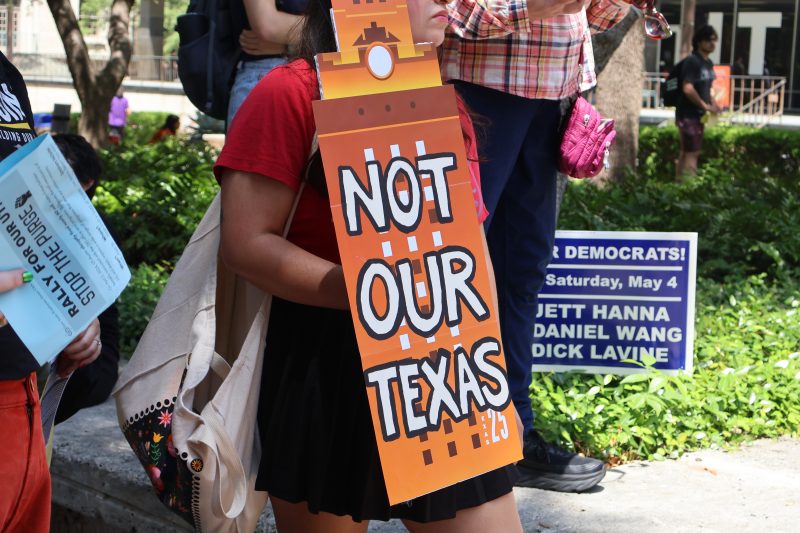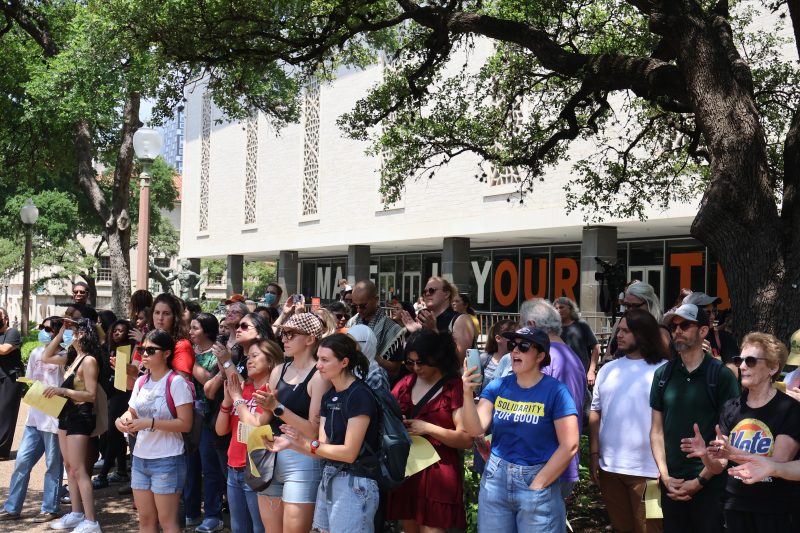UT Students Say They Feel Betrayed After a Year of Dismantling DEI Programs
By Abby L. Johnson, Michelle Lavergne, Michael Nolan, Isabella McGovern, Anissa Sanchez
Reporting Texas

Supporters of diversity, education and inclusion programs adopted the slogan ‘Not Our Texas’ to voice their opposition to dismantling of the programs. Isabella McGovern/Reporting Texas
“Faculty and staff educate! Texas leaders indoctrinate!” rang through the West Mall on the steps of the University of Texas Tower as a tumultuous spring semester came to an end. While protests over the Israeli-Palestinian conflict flared elsewhere on campus, these students and faculty came to rally against the university’s dismantling of diversity, equity and inclusion programs.
Programs that had been renamed or reimagined after a new anti-DEI state law, known as Senate Bill 17, took effect in January were suddenly shut down altogether in April. More than 60 people were laid off at UT-Austin and more than 100 lost their jobs statewide, according to an Associated Press tally of job losses.
“It’s such a betrayal,” said Anne Lewis, a radio-television-film professor at UT and executive board member of the Texas State Employees Union, which says that most of the jobs lost in the university’s DEI purge were held by women, Black and Latino staffers. “These are workers who worked to be in compliance with SB 17 before January to make sure their programs would continue.”
Texas is among the first states to successfully pass higher education DEI bans out of the 28 that have attempted to do so. The effects of the loss of these programs on individual students, staff and faculty, as well as the broader impact on campus culture are just now beginning to reveal themselves.
“I don’t fully recognize my university anymore,” Austin City Council member Zohaib Zo Qadri, a UT alumnus, said at the rally on the last day of spring semester classes.
The roots of today’s DEI programs, which aim to uplift and support primarily marginalized groups, can be traced to the civil rights movement. Following the murder of George Floyd in 2020, the nation saw a surge in the number of DEI programs — not only in public universities but in workplaces and other institutions. In the years since, those programs have become targets of a backlash by Republicans and others claiming a form of reverse discrimination.
“The philosophy of DEI is division, and its mission is to explain to students that the world is divided into two groups: oppressors, oppressed, colonizers, colonized,” said Sherry Sylvester, a distinguished senior fellow at the Texas Public Policy Foundation, a conservative think tank in Austin that is influential with the state Legislature and has been an outspoken advocate against DEI programs.
Such criticism prompted the 2023 Legislature to pass SB 17, which prohibits state universities from “ conducting trainings, programs or activities designed or implemented in reference to race, color, ethnicity, gender identity, or sexual orientation.” Gov. Greg Abbott signed it into law in June 2023, and Texas’ 38 public colleges and universities quickly began preparing by eliminating DEI offices, changing job titles and descriptions and renaming offices to comply with the new rule when it took full effect on Jan. 1.
UT dissolved its Multicultural Engagement Center on Jan. 1. It had been home to six UT-sponsored student groups, including the Afrikan American Affairs, Asian Desi Pacific Islander American Collective, Latino Leadership Council, Native American and Indigenous Collective, Queer Trans Black Indigenous People of Color and Allies and Students for Equity and Diversity.
UT’s Division of Diversity and Community Engagement changed its name to the Division of Campus and Community Engagement in December. Its vice president, education professor LaToya Smith, reaffirmed in a news release that the office remained committed to “fostering access and belonging” and to “serve all Longhorns and all Texans.” UT’s Gender and Sexuality Center announced in an Instagram post that it was closing Jan. 1 to make way for the Women’s Community Center.
But state Sen. Brandon Creighton, chair of the Senate Education Committee who had worked to pass SB 17, warned universities in March that renaming offices was not enough and that they risked state funding if they did not strictly enforce the DEI ban.
One week later, UT-Austin terminated over 60 employees on April 2. The newly renamed Division of Campus and Community Engagement and the Women’s Community Center were among those shut down.
“These were offices that served not only black, Latino and LGBTQ+ students but also veterans and students with disabilities,” Lewis said.
UT-Austin’s SB 17 guidance instructed student groups, such as the six that were housed under the Multicultural Engagement Center, to become registered student organizations to continue operations.
UT senior Amanda Garcia, an organizer for the group Texas Students for DEI, said that in light of office closures, students are left to fill in all the gaps.
“A lot of the action and response have been falling on the backs of students,” Garcia said. “We need to figure out how we can support each other and how we support each other’s programs.”
Undocumented students felt the impact of SB 17 when the university discontinued the Monarch Student Program, which had been providing support for recipients under the DACA program for immigrants who came to the U.S. as children. The Monarch Program helped students with internships, applications and financial aid.
Even cultural graduations were affected as the university said it would no longer fund them.
Garcia said that the university has done more than is required under SB 17 to mollify political leaders.
“Because UT is the flagship university, the other UT System schools tend to follow,” Garcia said. “We set a really bad example of how other universities should implement SB 17.”

Supporters of diversity, education and inclusion programs rally on the University of Texas’ West Mall on the last day of classes in the spring semester. UT and other state universities were directed by the Legislature to end DEI training and programs. Isabella McGovern/Reporting Texas
After the job cuts in April, students from various organizations a sent a letter to Creighton and UT President Jay Hartzell in an effort to open a dialogue about SB 17 but said they did not receive a response.
Angela Valenzuela, a professor at UT’s Center for Mexican American Studies, says the terminations have caused ripple effects on the well-being of student life on campus.
“Our students need support,” Valenzuela said. “They need to have a sense of belonging. Faculty and staff can’t carry the load, and even if we do, we can’t do it like people who are professionally trained and prepared and have the experience.”
Sylvester, from the TPPF think tank, says conservatives’ concern about DEI stems from a lack of progress in achieving their goals. “Questions have arisen from the lack of progress that we’re continuing to see, in terms of recruitment and improved outcomes, closing the gap between minority and marginalized students,” she said.
“All the things that they purported to do, including increasing minority faculty, none of that has been successful,” Sylvester said.
Rather than rely on DEI programs, she points to the “Top 10% Law” as a way to ensure student diversity on campuses. That 1997 law grants automatic admission to state-funded universities to Texas students who graduate in the top 10% of their high school classes. (The admission standard for UT-Austin has since tightened to the top 6%.)
But 20 years of data analyzed by researchers from Texas A&M University and University of North Carolina concluded that the policy has done little to diversify UT-Austin’s student body. They concluded the automatic admission system “did not recover racial diversity lost by Texas’s ban on affirmative action by showing that changes in the likelihood that high schools sent students to the flagship campuses were only trivially related to the racial composition of a high school.”
In 2017, UT unveiled its blueprint for creating a more inclusive culture on campus. One goal of that diversity plan was to bolster the university’s efforts in recruiting minority undergraduate and graduate students. It also aimed to expand professional development for faculty members to help them cultivate an inclusive environment in the classroom.
According to student demographic reports accumulated by Data USA, the proportion of students identifying as white dropped from 44% in 2016 to 37% in 2021. Latino/Hispanic enrollment increased from 21% to 24% in those years. Black enrollment remained at 4% in that period, despite 12% of all Texans being Black.
Meanwhile, faculty recruiters are beginning to report hearing of professors who are reticent to come to Texas because of the Legislature’s actions to limit tenure and ban DEI programs, in addition to Texas’ rolling back of abortion laws.
“A lot of competitive law professors have been turning down job offers because of the abortion ban and what has been happening with SB 17,” Garcia said. “I know that there are also a lot of faculty and staff actively seeking jobs at other institutions.”
The University of Texas System is not the only institution feeling the effects of SB 17. Universities across the state are grappling with how to handle the loss of student resources.
Last August, a flier appeared on the University of Houston’s LGBTQA resource center, announcing its imminent closure in line with SB 17. For many students, it signaled the beginning of the end to a facility which had been an outlet for many for over a decade.
“It was very sudden,” said Kaitie Tolman, the former president of Global, an LGBTQIA+ student organization at the University of Houston.
Later, the university announced the opening of a Center for Student Advocacy. The university said that the center would operate with the goal “to provide robust support to all students, ensuring they have the resources and opportunities to be successful, thrive, and graduate”.
Some students have been critical of the university’s response and the reduction in resources it has provided to those who were previously covered by the LGBTQA resource center and Center for Diversity and Inclusion.
“It’s a lot of work for the students,” said Tolman, who says student organizations have had to pick up the brunt of the work that was lost when the centers closed.
“Dropping these resources is not an option,” said Tolman.
Global recently helped to produce the university’s Lavender Graduation, a ceremony that honors the achievements of LGBTQ students. The ceremony was previously run by the LGBTQA resource center.
In College Station, Texas A&M University shut down its diversity, equity and inclusion programs at the beginning of the 2023 academic year, five months ahead of when SB 17 was set to go into effect.
“A&M prides itself on the familial environment, ” said Autumn Borowski, an A&M student and philanthropy executive of the Rosies, an inclusive women’s organization at A&M. “With SB17, thousands of students are feeling the effects of DEI policies — now feel less at home.”
Borowski said students understand that A&M must abide by the legislation, but they have been critical of the university’s lack of communication and support for affected students.
“It’s so hard to find what we need and provide what we need,” Borowski said.
For UT students, the legislation weighed heavily on their minds as the spring semester ended.
Neto, an undergraduate student at UT who asked that his name not be published, has had a hand in the LatinX Community Affairs and Texas Students for DEI organizations. He said the DEI dismantling has transformed the way he views the university.
“As a student, it’s been extremely disheartening to witness my dreams deteriorate right in front of my eyes,” he said. “The university I was promised to attend has been forced to transform into an institution that has been unwilling to stand for student voices that are contrary to the agenda that was placed upon it.”